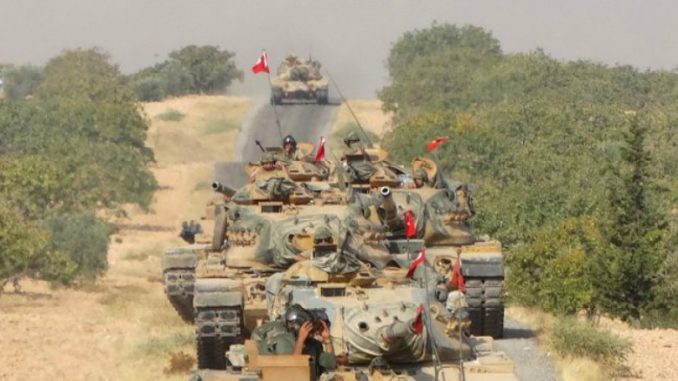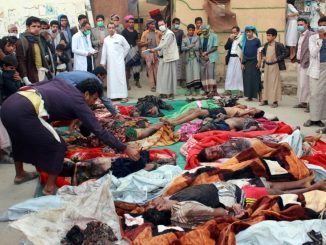
In a speech on the US Syria policy, Secretary of State Rex W. Tillerson explained that the continued American military presence on the ground would push back against Iran strengthening its position in Syria. The concern with Iranian presence in Syria and the need to prevent an ISIS comeback appear to constitute the new rationale for US troop presence in northern Syria. It, more importantly, represents a shift in US policy from counterterrorism to counterbalancing Iran. This new strategy, if it in fact materializes as such, would identify Syria as a battleground in the US efforts to confront and rollback Iran’s “malign influence” in the region.
Tillerson also underlined the need to be on the ground to have influence in the resolution of the Syrian conflict. The primary justification seems to be countering Iran in Syria, however, it remains unclear what specific steps the US will be willing to take against Iranian interests in Syria. It may contend itself with staying in Syria to avoid creating a vacuum to be filled by Iran or Russia. However, in the long run, this might prove to be an elusive goal. If the US tries to accomplish multiple strategic goals simultaneously, it will find it difficult to reconcile and prioritize them, when they come into conflict with each other. For instance, to ensure the non-return of ISIS, the US appears to be relying on the YPG, which Turkey considers a direct national security threat.
The new US strategy on Syria, if it is implemented as the Secretary of State has explained, could have been welcomed by Turkey if it didn’t rely on supporting the PKK’s Syrian branch, YPG. Turkey has not opposed the US military presence on the ground. It is the US partnership with an organization whose organic ties to the PKK have been acknowledged by US officials at the highest levels of government that represents the point of contention for Turkey. Despite Turkish protests and offers for alternative plans to defeat ISIS through the support of the moderate opposition groups, the US has declined to change course.
The US strategy to defeat ISIS revolves around working “by, with, and through local forces”[2] to avoid using US troops in actual fighting. However, the US has made a choice to work with the YPG – under the renamed Syrian Democratic Forces (SDF) – as opposed to other Arab opposition groups aligned with Turkey. The CENTCOM and other US government institutions have promoted the YPG-dominated SDF as the “most effective fighting force” on the ground. Media reports often highlight the often touted “secular and egalitarian” fighting force of the YPG through the “romanticized” spectacles of their female fighters.
There is no denying that the deep mistrust between Turkey and the US, especially since the Kobani crisis, has simply worsened and played a central role in the absence of a serious policy conversation between two allies. In the fall of 2014, the Obama administration made a choice to support the YPG against ISIS, defining it as an opportune moment to bleed ISIS militarily. ISIS appeared to be on the march at the time and breaking their momentum by supporting the YPG fighters in Kobani seemed like a low-cost gambit without putting any US lives at risk, accomplishing the administration’s no boots on the ground promise. The US assured Turkey that this was only a tactical move. Turkey facilitated the passage of Peshmerga troops from Iraq through Turkey into Kobani to help liberate the town from ISIS.[3] The YPG was not at all receptive to outside help, which is why it agreed only to a smaller number of Peshmerga. The YPG was more interested in proving itself as the ultimate fighting force the US could rely on and did not want to share the credit for repelling ISIS from Kobani. Despite Turkish warnings against the YPG’s political gambit as such, the US played along and invested in training and arming the YPG forces.
Turkey kept lobbying the US to limit and ultimately drop its support for the YPG warning against the PKK’s regional political ambitions and the YPG’s role in that scheme. Turkey considered its options in the face of a burgeoning US-YPG relationship. In August 2016, after the YPG’s crossing over into the west of the Euphrates, Turkey launched the Operation Euphrates Shield to prevent the creation of a contiguous zone dominated by the YPG in northern Syria. At the same time, Turkey hoped that a new momentum with the Trump administration could help change the US policy. The incoming Trump administration had to make the final decision on the Raqqa operation. Turkey pressed hard to convince the US to work with the Turkey-aligned moderate opposition groups, but its plans were rebuffed largely because of the Pentagon’s own plans about Raqqa and beyond. Having come to power with big promises about defeating ISIS, the Trump administration let the CENTCOM plans for Raqqa to proceed as planned and later authorized the direct arming of the YPG. Turkey patiently waited until the end of the Raqqa operation to see how the US policy vis-à-vis supporting the YPG would be clarified.
Turkey’s simultaneous diplomatic efforts with Russia and Iran through the Astana Process produced results in reducing violence, preventing additional refugee inflows, and fighting terror groups. As part of a deal on creating “deconfliction zones,”[4] Turkey entered into northern Idlib. By circling Afrin from the south, Turkey has ensured that the YPG could not create an autonomous and contiguous zone in its ambitions to reach the Mediterranean. This was in line with Turkey’s new counter-terrorism policy that requires fighting multiple terror threats from the YPG as well as ISIS not only inside the country but also across the border. the vacuum created by the civil war in Syria have been a blessing for terror organizations, which have often resulted in large influxes of refugees into Turkey. By agreeing to create deconfliction zones, Turkey sought to prevent yet another refugee inflow originating from Idlib in case of renewed military operations by the Assad regime. Both the Euphrates Shield[5] and the Idlib[6] operations have limited the YPG’s reach prevented them from connecting with Afrin in the west of the Euphrates river.
Turkey’s counter-terrorism efforts in northern Syria could not be coordinated with the US, particularly because of the diametrically opposed views on the YPG. This central rift has made it impossible to either devise a common policy or at least coordinate in northern Syria despite the fact that both the US and Turkey have been part of the anti-ISIS coalition. e two NATO allies have agreed on the broader goal of defeating ISIS but they have not been able to agree on how to achieve it without threatening Turkey’s security requirements. It is particularly the US preference to support the YPG that has caused this rift.
Today, as Turkey conducts its third major military operation into northern Syria, it is clear that the country is no longer willing to tolerate the YPG gains on the ground on the pretext of fighting ISIS. Although the YPG has been promoted as an effective fighting force against ISIS, they have changed the demographics in various regions by systematically pushing out Arab populations. They also excluded other Kurdish groups not aligned with the PKK, some of whom actually had to fled to Turkey. As ISIS no longer controls territory, the rationale for working with the YPG to defeat ISIS is moot. If the new justification for the continued relationship with the YPG is to prevent an ISIS return, it does not hold much water either because the long-term solution to the potential re-emergence of ISIS involves a much broader diplomatic and political investment to ensure stability in Iraq and Syria. Furthermore, working with a group led by a terror organization cannot bring about stability. If the US is interested in establishing long-term stability to prevent an ISIS return, it needs to work with Turkey. This would require a rethinking of the wisdom of allying with a sub-state actor that threatens a NATO ally.
If the new policy is predicated upon confronting Iran in the region, that assumes the YPG will be willing to play its part in “rolling back” Iranian influence in Syria. However, one of the very first things the PYD leadership did was to strike a deal with the Assad regime, which is under the thumb of Iran by now. If the new US policy on Syria is about stemming Iran’s influence and presence in Syria, the US policymakers will need to articulate the specifics or it will end up doing the exact opposite. For instance, will the US put pressure on pro-Iranian militias or Hezbollah in Syria through the use of the YPG? Will the YPG be really willing to confront Iran in any serious way? Given the continued existence of a relatively strong pro-Iranian clique within the PKK as well as its past dealings with Iran, the YPG will not be willing to fight against Iranian interests in Syria.
It has been a while now that the US debate on the YPG has revolved around “supporting the Kurds.” Any serious commentator knows that equating support for the YPG with support for the Kurds is disingenuous, unless it is just ignorance of the differences and divisions among the multiplicity of Kurdish groups. In addition to questioning the wisdom of fighting a terror group with another, Turkey has repeatedly underlined the fact that the PKK’s Syrian branch has specific goals threatening the country’s security. Some US commentators are so focused on “not abandoning Kurds” that they seem to forget about prioritizing the security of a NATO ally, like Turkey.
The lack of trust between Turkey and the US has definitely played a serious role in the absence of a common Syria policy but this is not unique. There are many disagreements within and between the NATO countries about what to do in Syria. Further, the broader lack of a coherent policy on the part of the US and Europe seriously limits Turkey’s options. However, Turkey is the NATO ally that is most affected by the security challenges emanating from Syria. Arriving at a common Syria policy, however much needed, will likely remain an elusive goal. In the meantime, however, Turkey should be able to expect the US to take its security concerns much more seriously. This means ceasing military support to the YPG dominated SDF in the short term and start a comprehensive strategic policy conversation with Turkey, both to prioritize the security of its NATO ally and also to ensure stability in Syria.



